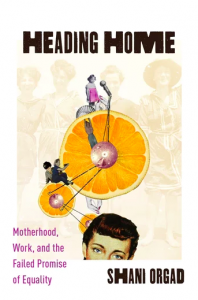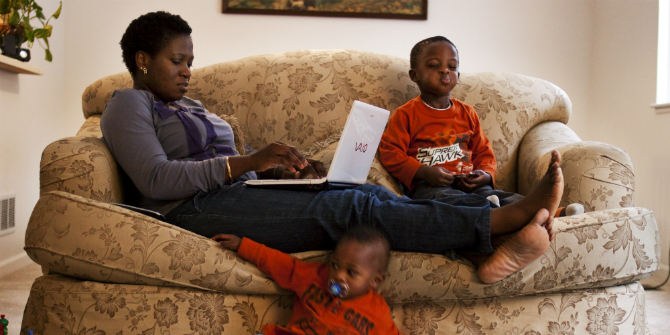 Media discourses on parenting websites and social media commonly associate parenting with happiness, however new research suggests there is a decline in individuals’ subjective wellbeing – either happiness or life satisfaction – once parenthood begins. In this post Shani Orgad outlines how structural failures such as the crisis in social care counter such mediated displays of happiness, and calls for urgent action to improve parents’ wellbeing. [Header image credit: P.-Put-CC-BY-NC-ND-2.0.jpg]
Media discourses on parenting websites and social media commonly associate parenting with happiness, however new research suggests there is a decline in individuals’ subjective wellbeing – either happiness or life satisfaction – once parenthood begins. In this post Shani Orgad outlines how structural failures such as the crisis in social care counter such mediated displays of happiness, and calls for urgent action to improve parents’ wellbeing. [Header image credit: P.-Put-CC-BY-NC-ND-2.0.jpg]
Social media platforms abound with photos of happy children that their proud parents ‘sharent’. These photos overwhelmingly exude happiness and sometimes are accompanied by captions such as “the happiest day of my life” or “happiest mum in the world!” Numerous aphorisms circulating online and in discourse more widely, perpetuate the association between parenting and happiness.
However, a new study reveals that parenthood does not necessarily bring happiness. The European SWELL-FER (Subjective Well Being and Fertility) study, whose key findings are reported in a July 2019 European Research Council policy brief, examined the relationship between wellbeing and fertility in European countries. It found that there is “a decline in individuals’ subjective wellbeing – either happiness or life satisfaction – once parenthood begins”. This is what some researchers dub the “parenting happiness gap”: in most advanced industrialised societies, there is accumulating evidence of lower levels of happiness among parents compared to non-parents, with the United States showing the largest disadvantage for parents.

Indeed, alongside the proliferation of platforms inviting parents to display their happiness and satisfaction, more and more parenting websites, blogs and social media platforms are providing a space for parents and, especially, mothers, to voice their frustration, disappointment, dissatisfaction, stress, anger and ingratitude. For, while fathers’ involvement with children is growing steadily, mothers largely remain the ‘foundation parent’ who have to do the lion’s share of childcare and household chores, and whose wellbeing, consequently, is affected more negatively.
Parenting websites and online platforms offer important supportive and even liberating spaces for mothers to discuss the messy realities, difficulties and dissatisfactions of mothering. At the same time, also widespread on these platforms are mother-blaming, mother-shaming and harsh judgements of mothers’ parenting practices. Mothers are frequently made to feel guilty about not being happy, or not being happy enough, and a plethora of parenting books, websites and programmes offer advice on how to be a happier and a better parent.
However, research consistently points out that the key problem is not mothers’ individual or psychological failure to be happy. Rather, the fundamental factors that mediate the relationship between individual wellbeing and happiness and parenting are structural and institutional. In particular, the endemic overwork culture, on the one hand, and the absence of social policies and dwindling resources to protect parents and families, on the other, have detrimental effects on parents’ wellbeing.
There is mounting evidence showing that parents, and mothers more than fathers, suffer from stress and mental health problems as a result of the current crisis in social care. The “sandwich generation” – women aged 35 to 49 with caring responsibilities for both children and elderly parents – show the highest rates of stress. In a recent survey, which covers 23 markets, 88% of the women in this group said they were stressed at work, with many claiming to be in an ‘always on’ work environment, where they are expected to respond to work emails in the evening or at weekends.
For my new book, Heading Home, Motherhood, Work, and the Failed Promise of Equality, I interviewed educated women who belong to this age group, who had professional careers and quit their jobs after having children. Although this group of women is a minority, an astounding 20% of stay-at-home mothers in the UK are highly educated, while in the US, a quarter of stay-at-home mothers have college degrees. So why do highly educated women who could afford childcare, give up education and successful careers, seemingly, to embrace motherhood as a full-time occupation?
Rather than a free choice, I found that these women’s decisions to leave paid employment were shaped by a combination of factors, many of which were not of their own making:
- work structures and work cultures that are utterly incompatible with family life, where late hours and sleep deprivation are the norm, and where commitment to career supposes that one never thinks about, values or does anything else
- denial of requests to work part-time; gender pay gaps
- precarious work contracts
- implicit or explicit pressure from male partners working in ‘always on’ jobs
- lack of suitable and sustained childcare support; and stubborn social perceptions against which women constantly are measured and judged by family, friends, employers and co-workers, media and government.
While the women I interviewed clearly identified the institutional and structural problems that affected their wellbeing, and which ultimately pushed them to quit their careers, they continuously blamed themselves for failing to live up to the ideal of “work-life balance”. “I don’t have the personality type of a professional mother,” “I’m not a natural,” “I was not ‘cut out’ for this type of demanding job,” they told me. However, rather than mothers not being ‘cut out’ to cope, it is the current system – toxic work cultures and the undervalued and fast-shrinking social care provision – that is not cut out to support mothers and families.
Urgent and serious action at the structural level is required from government, employers and society at large, to improve parents’ wellbeing and, most crucially, to enable more just and humane working and family lives for everyone. This includes:
- challenging long hours work cultures
- investing in ways that would enable men to assume a fair share of the domestic workload and caring responsibilities on a continuous basis
- encouraging more fathers to work part-time and flexibly
- offering families affordable quality childcare
- investing in policies and services aimed at promoting and protecting work-life balance, such as the adoption last month of the EU Work-Life Balance Directive
This article represents the views of the authors, and not the position of the LSE Parenting for a Digital Future blog, nor of the London School of Economics and Political Science.






